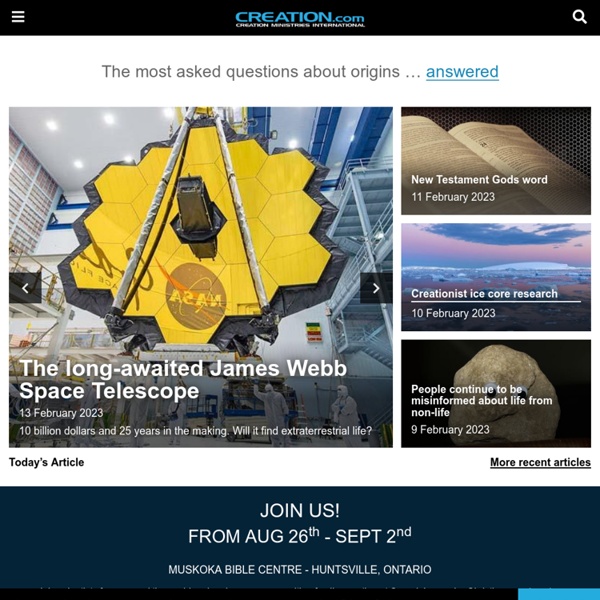



Get Answers Why should a Christian ministry maintain a list of arguments creationists should avoid? As a ministry, we want to honor God and represent Christ well when we defend His Word. This means using honest, intellectually sound arguments that are based in Scripture, logic, and scientific research. Because there are so many good arguments for a recent creation (which the Bible clearly teaches), we have no need to grasp at straws—arguments using questionable logic and tenuous or no evidence. Furthermore, there is little harm in avoiding questionable arguments—or, at least, stating that certain interpretations of evidence are doubtful—since there are plenty of valid arguments with well-documented evidences against molecules-to-man evolution, atheism, and the like. A final reason for avoiding flawed arguments is that it leads to faulty thinking. (These listings are not comprehensive but are instead some of the most common faulty arguments.) Arguments that should never be used
Books and papers every graduate student should read Jump to For grad students in any field Resources for writing Writing is the default activity in graduate school. A discovery isn't a discovery unless you can communicate that discovery. A lot of academic writing is horrible, and it tends to be horrible in multiple ways: presentation, ordering, clarity, style, and sometimes even grammar and punctuation. Better writing makes peer reviewers inclined to invest time in it. On writing style, Style: Lessons in Clarity and Grace simply nails it. The Chicago Manual of Style is an indispensable reference: I didn't find A Manual for Writers of Research Papers, Theses and Dissertations until after my defense, but it is relevant to any kind of academic or technical writing. Like the Chicago book, it's a superb reference tome. Resources for presenting (yourself) Graduate students can't avoid giving presentations. Once again, most academics give awful presentations. will make every presentation you give better at the cost of just one afternoon's reading. Practice
Dissent Magazine What every computer science major should know Portfolio versus resume Having emerged from engineering and mathematics, computer science programs take a resume-based approach to hiring off their graduates. A resume says nothing of a programmer's ability. Every computer science major should build a portfolio. A portfolio could be as simple as a personal blog, with a post for each project or accomplishment. Contributions to open source should be linked and documented. A code portfolio allows employers to directly judge ability. GPAs and resumes do not. Professors should design course projects to impress on portfolios, and students, at the conclusion of each course, should take time to update them. Examples Technical communication Lone wolves in computer science are an endangered species. Modern computer scientists must practice persuasively and clearly communicating their ideas to non-programmers. Unfortunately, this is not something fixed with the addition of a single class (although a solid course in technical communication doesn't hurt). Java
New Politics quora Theory Talks A Survival Guide to a PhD This guide is patterned after my “Doing well in your courses”, a post I wrote a long time ago on some of the tips/tricks I’ve developed during my undergrad. I’ve received nice comments about that guide, so in the same spirit, now that my PhD has come to an end I wanted to compile a similar retrospective document in hopes that it might be helpful to some. Unlike the undergraduate guide, this one was much more difficult to write because there is significantly more variation in how one can traverse the PhD experience. Therefore, many things are likely contentious and a good fraction will be specific to what I’m familiar with (Computer Science / Machine Learning / Computer Vision research). But disclaimers are boring, lets get to it! Preliminaries First, should you want to get a PhD? Freedom. Ownership. Exclusivity. Status. Personal freedom. Maximizing future choice. Maximizing variance. Personal growth. Expertise. The disclaimer. Picking the school. Adviser Student adviser relationship. Go.